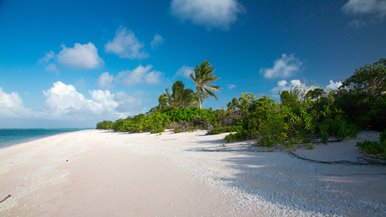Find the latest news for Marshall Islands
On this page
Embassies and consular services for Marshall Islands
| Location | Service areas |
|---|---|
| Embassy of the Republic of the Marshall Islands | |
| New Zealand Consulate-General, Honolulu, Hawai’i | Marshall Islands, Micronesia (Federated States of), Palau, United States of America |
Our relationship with the Marshall Islands

The Republic of the Marshall Islands is an independent Pacific nation with a population of approximately 55,000, spread across low-lying coral atolls spanning nearly two million square kilometres of ocean territory.
The Marshall Islands is an independent nation in Free Association with the United States, a status established in 1986. New Zealand established diplomatic relations with RMI in 1988. The Marshall Islands manages its own domestic and foreign affairs, while the United States retains responsibility for defence and security.
New Zealand’s relationship with the Marshall Islands is built on shared interests in key regional issues, including fisheries, climate change, and Pacific security. Both countries are active members of the Pacific Islands Forum (PIF) and participate in the Council of Regional Organisations of the Pacific (CROP), including agencies such as the Secretariat of the Pacific Regional Environment Programme (SPREP) and the University of the South Pacific (USP).
Development cooperation and sustainability
The Marshall Islands faces a range of development challenges. Its geographic isolation, limited natural resources, and low average elevation—just two metres above sea level—make it one of the most climate-vulnerable countries in the world.
New Zealand provides bilateral development support to the Marshall Islands through our North Pacific development programme, which also includes the Federated States of Micronesia and Palau. Our cooperation focuses on key areas such as fisheries management, climate change resilience, tertiary education, and child and maternal health.
We work in partnership with the Marshall Islands on initiatives that strengthen climate and disaster resilience(external link), and we provide funding to the Marshall Islands Marine Resources Authority to support sustainable fisheries.
Some of this support is delivered through the North Pacific Development Fund(external link) which provides small grants to community-led projects that promote income generation, employment, training, disaster preparedness, and local development.
Marshall Islands scholars are eligible for the Manaaki New Zealand Scholarship Programme(external link) which offers undergraduate and postgraduate tertiary scholarships, thematic short-term training, and vocational/professional short-term training. More information, including availability and the application process is available here(external link).
For detailed information on New Zealand’s development cooperation activities in RMI—including project descriptions, timeframes, sectoral focus, and expenditure—visit DevData(external link).
Trade and investment
Due to the geographic distance between New Zealand and the Marshall Islands, and the absence of direct shipping links, two-way trade remains modest. For the most up-to-date information on New Zealand’s trade profile with the Marshall Islands, including export and import data, visit the New Zealand Trade Dashboard(external link).
Fisheries are the largest source of domestic revenue for the Marshall Islands, playing a central role in the country’s economy. The primary source of overall government revenue comes from the Compact of Free Association with the United States, which provides financial assistance and supports key public services
People and culture
New Zealand and the Marshall Islands share a warm and growing relationship, underpinned by strong cultural ties and a shared Pacific identity.
Our partnership reflects mutual interests in regional cooperation, sustainable development, and climate resilience, and is supported through diplomatic, development, and community-level partnerships

